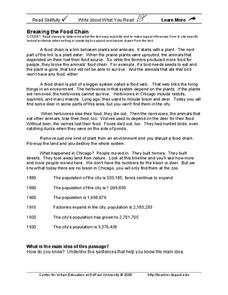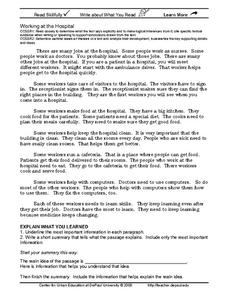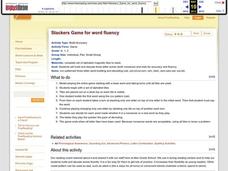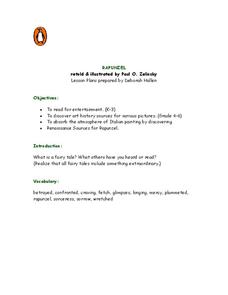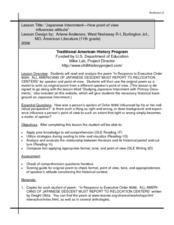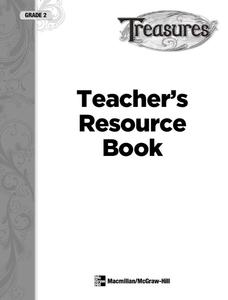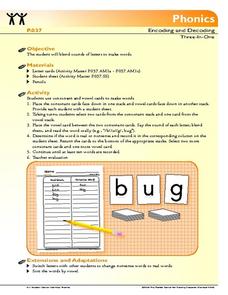Curated OER
ELA High-Frequency Sight Words
Read high frequency words and rearrange scrambled sentences in order to make proper sentences with pupils. They will also practice oral fluency by reading a word assigned to them. These activities reinforce reading fluency and vocabulary...
Curated OER
Phonics: Decode and Write Words
Sounding out individual phonemes and blending them to make a word is usually one of the first tasks mastered when learning to read. Make master decoders out of your learners, they sound out a series of simple two and three-letter cvc...
Curated OER
Phonics: Decode and Write Words with Blends
Kids see, say, then count the phonemes they hear in a series of simple words. They practice counting phonemes with the teacher, then sound out the same word on their own. As they count each phoneme they write it down on their paper. A...
Curated OER
Comprehension: Identify the Main Idea from Text
Children in first grade listen and read along with the teacher to practice main idea identification. They use the provided reading passages to read, locate the main idea and supporting details. This is a fully scripted lesson which means...
Curated OER
Alexander and the Terrible, Horrible, No-Good, Very Bad Day
Second graders interact with the story of Alexander's horrible day by connecting it to their lives. They practice predicting, writing paragraphs, reading aloud, discussing his problems, making a card to cheer him up, and designing a pair...
DePaul University
Breaking the Food Chain
Throughout history, the growth of big cities has resulted in the destruction of ecosystems. In the case of Chicago, IL, a grassland that was once home to bison, deer, wolves, and foxes quickly became a booming city of over three million...
Curated OER
Working at the Hospital
Having this reading passage handy to assess your learners' ability to process written text, practice summary with your class, and improve reading comprehension. This passage is about the people who work at the hospital. Learners read...
Curated OER
Stackers Game for Word Fluency
Explore words by building and decoding three-letter words. Real or nonsense words can be formed with the alphabet tiles. Practice fluency and blending sounds with CVC patterns.
Curated OER
Rapunzel
Youngsters read the story of Rapunzel and go over vocabulary and answer discussion questions. They also list qualities of characters, discuss settings, make a diorama, and more.
K12 Reader
Fun in the Sun
Don't shun this worksheet based around -un words! Class members read a quick poem full of -un words and then respond to three comprehension questions about the text.
K12 Reader
My Sled is Red
Celebrate the snow with a quick exercise featuring a short poem about a sled. Learners practice -ed words and answer three included reading comprehension questions.
Curated OER
Vocabulary Instruction: Identify and Sort Common Words into Categories
Kids learn about the concept of nouns. They practice identifying nouns by sorting words into categories. As the teacher holds up each word, the class reads it in unison, then they take turns identifying it as a noun or non noun word....
DePaul University
Working at the Television Station
There's a lot that goes on behind the scenes of a local news program. Read this passage independently or as a whole class to learn about all the different people that work hard to bring us the news. Afterward, young learners determine...
Curated OER
Finding the Main Idea: Little Women
Whether or not your class is reading Louisa May Alcott’s Little Women, you can use this exercise as the basis of a mini-lesson on how to determine the main idea of a passage or as a pre-test to assess mastery of the skill. A graphic...
Polk Bros Foundation
Read to Learn
Prepare for a research project or just use this worksheet on its own. Class members choose a topic, write a big question about it, and note down information they find about it. The final product is a longer written assignment in the...
Polk Bros Foundation
I Can Locate and Classify Information About a Topic
After reading a text, ask your pupils to recall and organize what they've just learned into a blank three-column chart. Class members write the topic and fill in the columns with information. The sheet also prompts learners to write a...
Curated OER
West Nile Virus-What is the Risk?
Begin with an online pre-quiz about West Nile Virus. Using a fictional scenario, young epidemiologists read how it is transmitted and examine the stages of the life cycle of a mosquito. They imagine that they are members of the Centers...
Curated OER
Japanese Internment--How Point of View Influences Attitude
How does background and experience influence one's point of view? Dwight Okita's famous poem about the Japanese internment is the text used to explore this essential question. Class members study primary documents to gain the necessary...
McGraw Hill
Phonics Teachers Resource Book
Looking to improve your classes literacy program? Then look no further. This comprehensive collection of resources includes worksheets and activities covering everything from r-controlled vowels and consonant digraphs, to the...
Florida Center for Reading Research
Phonics: Encoding and Decoding, Three-In-One
Scholars use the provided pack of alphabet cards to construct basic CVC words, then write down each word they make in one of two columns. Column one is for real words and column two is for nonsense words.
Florida Center for Reading Research
Phonics: Encoding and Decoding, Make-A-Word
Little learners place a picture card on a magnetic board, say the name of the object on the card, then sift through alphabet magnets to find and spell the word they said.
Florida Center for Reading Research
Phonics: Letter Recognition, Hungry Letter Mouse
Scholars take turns writing and identifying letters on a whiteboard. Learner one writes a letter; learner two finds it on the alphabet strip. If they are correct, Mr. Mouse gets to eat that letter, and if they are incorrect, Mr. Mouse...
Florida Center for Reading Research
Phonological Awareness: Phoneme Matching, Pack-a-Backpack
Scholars sort words based on their initial phoneme or sound. Learners are given two backpacks, each with a picture card; they search and match picture cards with the same initial sound as the ones on each backpack.
Florida Center for Reading Research
Phonological Awareness: Phoneme Matching, Medial Match
Early readers get together and match medial phonemes. They take turns picking picture cards from a pile; they say each word, then determine whether the pair has matching medial sounds.
Other popular searches
- Context Clue Reading Centers
- Hands on Centers Reading
- Guided Reading Centers
- Constitution Reading Centers
- 2nd Grade Reading Centers
- Kindergarten Reading Centers
- Mangement of Reading Centers
- Constituiton Reading Centers
- Management of Reading Centers
- Centers for Reading







